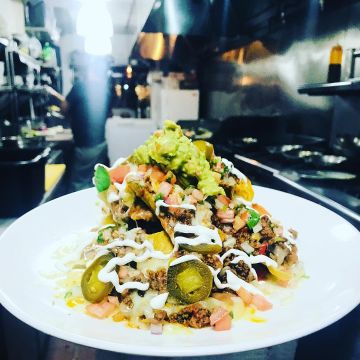Enjoy freshly made freshly made guacamole during dinner
Is Mexican Food Healthy? Unloading the Nutritional Benefits of Typical Components
The question of whether Mexican food is healthy and balanced invites an expedition of its traditional ingredients. Beans and corn offer as fundamental staples, abundant in healthy protein and fiber. Avocados supply useful fats, while numerous natural herbs and flavors include taste and wellness advantages - happy hour. With each other, these elements produce a tapestry of nutrition. The healthfulness of Mexican food frequently depends on preparation methods and portion dimensions. What duty do these elements play in determining its general dietary value?
The Power of Beans: Protein and Fiber-Rich Staples
Although frequently overlooked, beans act as a cornerstone of Mexican food, supplying a wide range of dietary advantages. Rich in healthy protein, they are an exceptional plant-based choice for those looking for to meet their dietary healthy protein requires. This high healthy protein web content sustains muscle fixing and growth, making beans invaluable for both meat-eaters and vegetarians alike. Additionally, beans are an exceptional source of nutritional fiber, which assists in food digestion and advertises a sensation of volume, potentially aiding with weight management.
The selection of beans used in Mexican dishes, such as black beans, pinto beans, and kidney beans, adds to a diverse flavor account and can boost meals nutritionally. Moreover, beans are low in fat and include crucial vitamins and minerals, consisting of iron, magnesium, and folate. Together, these qualities make beans an essential component, providing both nourishment and food in conventional Mexican fare.

Corn: a Versatile Grain With Nutritional Benefits
Corn stands apart as a functional grain fundamental to Mexican cuisine, celebrated not only for its cooking applications however likewise for its remarkable nutritional account. As a main active ingredient in dishes like tortillas, tamales, and pozole, corn offers important nutrients that add to a well balanced diet. Rich in carbs, it functions as a considerable energy resource, while additionally being reduced in fat, making it a favorable option for various dietary needs.
In addition, corn is an excellent source of dietary fiber, which helps in digestion and promotes satiety. It contains substantial amounts of vitamins such as B-complex vitamins, which are important for basal metabolism. The visibility of antioxidants, particularly carotenoids, adds to total health by reducing oxidative stress. Additionally, corn is gluten-free, satisfying those with gluten sensitivities. Overall, the dietary advantages of corn highlight its importance in traditional Mexican food and its function in a healthy diet plan.
Avocados: Healthy Fats and Nutrients in Every Bite
Avocados play a substantial function in Mexican cuisine, enhancing meals with their velvety structure and abundant taste. Past their culinary appeal, avocados are commemorated for their excellent dietary account. They are a rich resource of healthy monounsaturated fats, which can assist lower poor cholesterol levels and support heart health and wellness. Furthermore, avocados are loaded with important minerals and vitamins, consisting of potassium, vitamin E, and B vitamins, adding to general wellness.
The high fiber web content in avocados aids digestion and advertises satiety, making them a valuable addition to any dish. Their one-of-a-kind nutrient composition can additionally sustain skin health and wellness and provide anti-inflammatory benefits. Including avocados right into traditional Mexican dishes or appreciating them as a standalone snack can boost both flavor and nutrition, demonstrating why they are a cherished staple in Mexican food. On the whole, avocados offer a tasty means to enjoy healthy fats and critical nutrients in every bite.

Natural Herbs and flavors: Flavorful Health Boosters
While delighting in the abundant flavors of Mexican food, one can not ignore the necessary function that spices and herbs play in boosting both taste and wellness. Ingredients such as chili, oregano, and cilantro peppers not only add to the lively flavor account however likewise provide substantial health and wellness benefits. Cilantro is recognized for its cleansing residential or commercial properties, assisting to eliminate heavy steels from the body, while oregano is loaded with anti-oxidants and possesses anti-inflammatory effects.
Chili peppers, a staple in lots of Mexican meals, have capsaicin, which has been connected to improved metabolic rate and discomfort read what he said relief. In addition, seasonings like cumin and coriander support food digestion and might help in blood sugar level regulation. Including these delicious wellness boosters into dishes not only improves the cooking experience but additionally promotes overall health, making Mexican food not just delicious, yet also nutritionally beneficial.
Conventional Food Preparation Approaches: Enhancing Nutrition and Flavor
Typical food preparation methods in Mexican cuisine play a crucial role in boosting both nourishment and taste, as they usually focus on fresh active ingredients and time-honored strategies. Techniques such as nixtamalization, where corn is soaked and cooked in an alkaline solution, not just improve the nutrient profile of tortillas but additionally enhance their digestibility - best mexican westchester NY. In addition, the use of slow-moving food preparation methods, like stewing or braising, enables tastes to combine magnificently while preserving the honesty of the ingredients

Regularly Asked Concerns
Are Mexican Food Portions Typically Larger Than Other Cuisines?
Mexican food sections are often larger than those of several various other foods. This particular mirrors standard dining techniques, emphasizing common sharing and hearty dishes, which can bring about a much more substantial serving dimension in general.
Exactly how Does the Preparation Technique Affect Healthfulness of Mexican Food?
Preparation approaches considerably influence the healthfulness of Mexican food. Strategies such as barbecuing or steaming maintain nutrients, while frying can enhance undesirable fat web content. Selections of active ingredients and cooking designs ultimately establish general nutritional value.
Can Mexican Food Be Tailored for Details Dietary Restrictions?
Mexican food can certainly be customized for certain dietary limitations. Substitutions, such as utilizing corn tortillas for gluten-free diets or integrating more veggies, allow individuals to enjoy conventional flavors while fitting numerous nutritional requirements.
What Prevail Misunderstandings Concerning Mexican Food and Health?
Common misconceptions concerning Mexican food consist of the idea that it is naturally harmful, extremely spicy, and solely focused on fats. In truth, typical recipes usually include nutritious components and can be customized to different nutritional needs.
Are There Much Healthier Alternatives at Mexican Dining Establishments?
Healthier alternatives at Mexican restaurants usually consist of smoked meats, beans, and fresh veggies. Picking dishes that highlight whole components and avoiding heavy sauces can result in a much more nourishing eating experience, advertising overall wellness.
The variety of beans Check Out Your URL made use of in Mexican recipes, such as black beans, pinto beans, and kidney beans, adds to a varied flavor account and can improve dishes nutritionally. Avocados play a considerable duty in Mexican cuisine, complementing dishes with la fontana their velvety texture and rich flavor. Including avocados right into conventional Mexican recipes or appreciating them as a standalone snack can improve both taste and nourishment, demonstrating why they are a precious staple in Mexican food. While delighting in the abundant tastes of Mexican cuisine, one can not overlook the vital duty that spices and natural herbs play in improving both taste and health. Typical food preparation approaches in Mexican cuisine play an important duty in boosting both nourishment and taste, as they usually focus on classic techniques and fresh components.